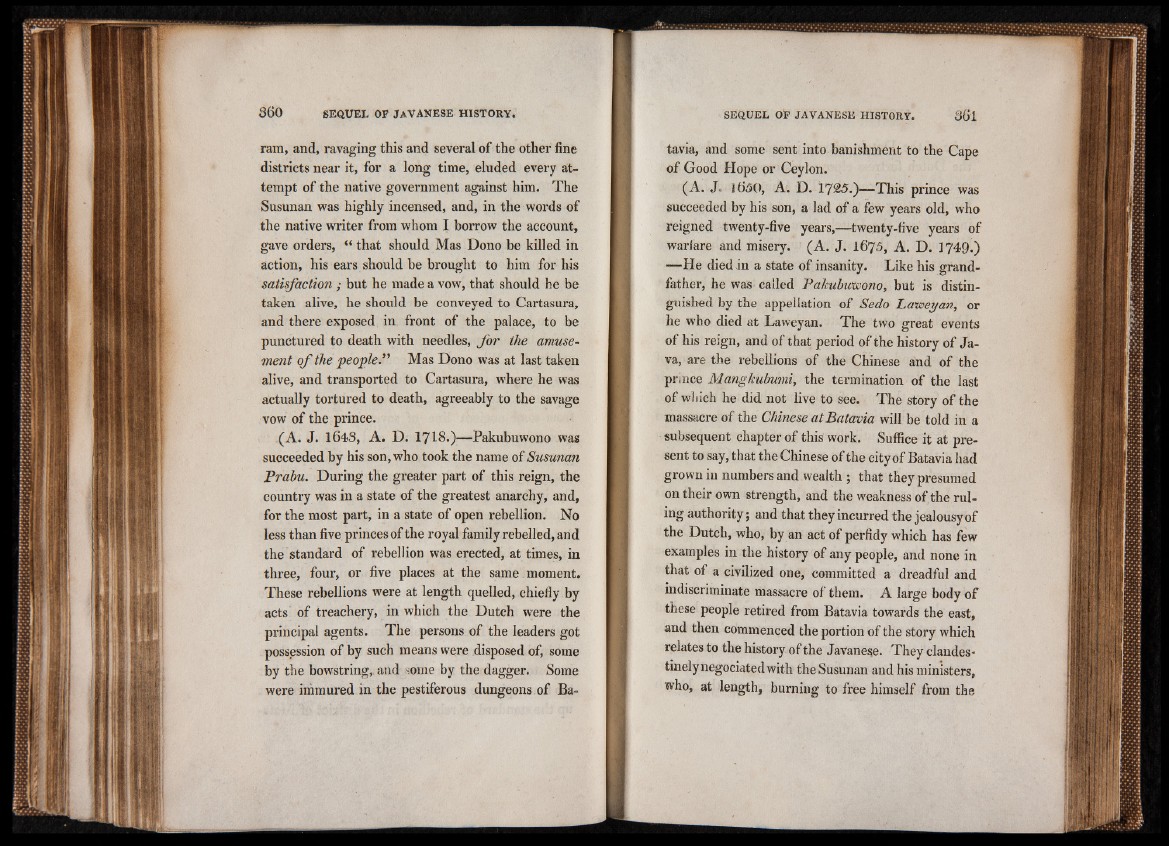
ram, and, ravaging this and several of the other fine
districts near it, for a long time, eluded every attempt
of the native government against him. The
Susunan was highly incensed, and, in the words of
the native writer from whom I borrow the account,
gave orders, “ that should Mas Dono be killed in
action, his ears should be brought to him for his
satisfaction ; but he made a vow, that should he be
taken alive, he should be conveyed to Cartasura,
and there exposed in front of the palace, to be
punctured to death with needles, for the amuse-
ment of the p e o p l e Mas Dono was at last taken
alive, and transported to Cartasura, where he was
actually tortured to death, agreeably to the savage
vow of the prince.
(A. J. 164)3, A. D. 1718.)—Pakubuwono was
succeeded by his son, who took the name of Susunan
Prabu. During the greater part of this reign, the
country was in a state of the greatest anarchy, and,
for the most part, in a state of open rebellion. No
less than five princes of the royal family rebelled, and
the standard of rebellion was erected, at times, in
three, four, or five places at the same moment.
These rebellions were at length quelled, chiefly by
acts of treachery, in which the Dutch were the
principal agents. The persons of the leaders got
possession of by such means were disposed of, some
by the bowstring, and some by the dagger. Some
were immured in the pestiferous dungeons of Batavia,
and some sent into banishment to the Cape
of Good Hope or Ceylon.
(A. J. J650, A. D. 1 7&5.)—This prince was
succeeded by his son, a lad of a few years old, who
reigned twenty-five years,—twenty-five years of
warfare and misery. (A. J. 1675, A. D. 174 9 .)
—He died in a state of insanity. Like his grandfather,
he was called Pakubwwono, but is distinguished
by the appellation of Sedo Laweyan, or
he who died at Laweyan. The two great events
of his reign, and of that period of the history of Java,
are the rebellions of the Chinese and of the
prince Mangkubwni, the termination of the last
of which he did not live to see. The story of the
massacre of the Chinese at Batavia will be told in a
subsequent chapter of this work. Suffice it at present
to say, that the Chinese of the city of Batavia had
grown in numbers and wealth ; that they presumed
on their own strength, and the weakness of,the ruling
authority; and that they incurred the jealousyof
the Dutch, who, by an act of perfidy which has few
examples in the history of any people, and none in
that of a civilized one, committed a dreadful and
indiscriminate massacre of them. A large body of
these people retired from Batavia towards the east,
and then commenced the portion of the story which
relates to the history of the Javanese. They clandestinely
negociated with the Susunan and his ministers,
who, at length, burning to free himself from the